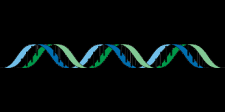What It Means To Be Human Is Changing Thanks To Gene Editing
By Joe Matthews (Zócalo Public Square),
Huffington Post
| 05. 27. 2016
Near the end of a wide-ranging conversation about the complexity of the human genome and the history and future of genetics, Arizona State University President Michael Crow noted the almost inconceivably large number — “10 to the 14th” power — of microorganisms in our bodies. And then he turned to cancer researcher Siddhartha Mukherjee and posed what Crow called “a complicated question.”
“What the hell are we?”
Crow and Mukherjee, author of the new book “The Gene: An Intimate History” and the Pulitzer Prize-winning “The Emperor of All Maladies: A Biography of Cancer,” already had spent much of the evening — a Zócalo Public Square event in front of a full house at the Skirball Cultural Center — trying to answer that question.
One answer, said Mukherjee, is “a majestic formula” akin to e=mc102: “Genes plus environment plus genetic interactions plus chance” equals the human form.
But what it means to be human is also changing, he said, both biologically and culturally. Our increasing knowledge and ability to manipulate our genes — the fundamental units of heredity and the basic...
Related Articles
By Pete Shanks
| 02.27.2026
Last month, we published “The Shameful Legacy of Tuskegee” which focused on a proposed experiment in Guinea-Bissau. The study’s plan echoed the notorious Tuskegee disaster, withholding safe, effective vaccines against hepatitis B from some newborns while inoculating others. It was to be financed by the U.S. but performed by a controversial Danish team. That project provoked a multi-national outcry, leading to a remarkable response from the World Health Organization:
WHO has significant concerns regarding the study’s scientific...
By Jenn White, NPR | 02.26.2026
By Kiana Jackson and Shannon Stubblefield, New Disabled South | 02.09.2026
"MC0_8230" via Wikimedia Commons licensed under CC by 2.0
This report documents a deliberate assault on disabled people in the United States. Not an accident. Not a series of bureaucratic missteps. An assault that has been coordinated across agencies...
By Scott Solomon, The MIT Press Reader | 02.12.2026
Chris Mason is a man in a hurry.
“Sometimes walking from the subway to the lab takes too long, so I’ll start running,” he told me over breakfast at a bistro near his home in Brooklyn on a crisp...




